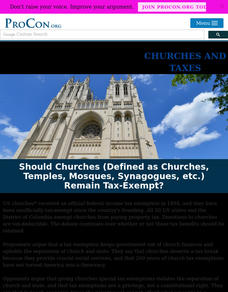Judicial Learning Center
Getting Ready for Trial
A courtroom can be a scary place for the uninitiated. Get familiar with the process using a helpful overview of the activities that take place prior to both civil and criminal cases. The lesson explains the differences between civil and...
Judicial Learning Center
Your Day in Court
Whether out of choice or necessity, people want to know what will happen on a typical day in court. A helpful lesson walks scholars in the field of criminology through the trial process from opening statements to the final verdict.
Judicial Learning Center
The Appeal Process
Why doesn't the Supreme Court hear testimony from witnesses? How do they complete an entire proceeding in less than two hours? A helpful lesson guides scholars of criminology through these and other questions by explaining how appeals...
Judicial Learning Center
The Players in the Courtroom
Courtrooms are complicated. In addition to the many rules, there are a number of people whose jobs are not very clear to the casual courtroom observer. With the resource, individuals identify some of these roles and review more...
Judicial Learning Center
The Judge and the Jury
Unless you are a lawyer, you might not understand just how unrealistic Law and Order and other legal dramas actually are. Here's a great resource to help scholars of criminology gain a more realistic perspective. The lesson outlines the...
Judicial Learning Center
Judicial Independence
Most people support the idea of an independent judiciary in theory until they hear about a court case that violates their principles. An informative resource explains why the concept is important. It also provides scholars of criminology...
Judicial Learning Center
About Federal Judges
Not just anybody can do the job of a federal judge, but according to the United States Constitution just about anybody can be appointed. The lesson outlines the process and requirements for becoming a federal judge, focusing on the...
Judicial Learning Center
The U.S. Supreme Court
How do Supreme Court justices determine which cases to consider? What happens when the Supreme Court decides not to take a case? The lesson explores important questions and others in the field of criminology. It focuses on the appeals...
Judicial Learning Center
Levels of the Federal Courts
The Supreme Court gets all the glory, but very few federal cases make it to the highest court. An interesting lesson explores the structure of the lower levels of the federal court system. In addition to outlining the organization of...
Judicial Learning Center
State Courts vs. Federal Courts
Popular culture often portrays the Feds as the most fearsome of law enforcement agencies. Yet, someone charged with a crime is considerably more likely to end up in a state court. The lesson, one of six covering the Organization of the...
Judicial Learning Center
The Constitution
Supreme Court justices debate the meaning of the US Constitution, but we expect teachers to explain it to scholars with far less training and experience. A daunting task for sure, but it's not insurmountable with resources that simplify...
Judicial Learning Center
Article III and the Courts
What's the best way to make sense of the Constitution? A helpful lesson contains both the text of Article III and annotation of each of its sections, breaking it down into easy-to-understand parts. It also includes links to a glossary...
Judicial Learning Center
The Constitution and Rights
What's the right way to teach young historians about the Bill of Rights? Many an instructor has asked this question when pondering lesson plans over the US Constitution. The Constitution and Rights is a nifty resource that provides a...
Judicial Learning Center
Law and the Rule of Law
We hear a lot about the importance of the rule of law, but most people do not really know what those words mean. The lesson is a webpage that defines the rule of law, explains why it is important in a democratic society and provides...
Judicial Learning Center
The Ratification Debate
Most Americans profess their love for the US Constitution, but this was not always the case. An informative lesson overviews the debate between the Federalists and Anti-Federalists by summarizing the main arguments of each side. It...
iCivics
County Basics
To understand the concept of a county government system, scholars read a short passage, view a helpful visual aid, use the web to conduct some research about their local areas, and then answer related questions online.
ProCon
Cuba Embargo
President John F. Kennedy bought 1,200 Cuban cigars the night before he enacted the Cuban trade embargo in 1962. Should the United States maintain the embargo? Using the website, pupils explore the topic to prepare for a class debate or...
Curated OER
Corporate Tax Rate and Jobs
Does lowering the corporate tax rate help create jobs in the United States? Learners explore the top pro and con arguments and quotes relating to the issue. They read background information about the creation of the federal corporate...
Curated OER
Corporal Punishment
Nineteen states legally permit school officials to physically punish children. Scholars learn more about the topic as they use the website to prepare for a class debate or discussion. Pupils read background information and discover the...
Curated OER
Concealed Handguns
Should adults be allowed to carry concealed handguns? Pupils use the website to research the topic thoroughly and weigh the pros and cons. They read background information on gun control and learn about the main arguments surrounding the...
Curated OER
College Education
What do Bill Gates and Mark Zuckerberg have in common? They're both billionaires, and neither one has a college degree! Using the website, scholars explore whether having a college education is truly worth the money it costs. They read...
Curated OER
Climate Change
Rising sea levels, strong storms, melting ice ... who or what is to blame? Scholars browse the website in preparation for a class discussion or debate about whether human activity is causing climate change. They gain a balanced...
Curated OER
Churches and Taxes
Churches have been tax-exempt since the founding of America, but should they be? Pupils ponder the question as they browse the website in preparation for a class debate or discussion. They research the history of tax-exemption for...
Curated OER
Cell Phone Radiation
Should people be more worried about cell phone radiation? Scholars read extensive background information about the issue to prepare for a class discussion or debate. As they explore the website, they learn the main arguments for and...

























